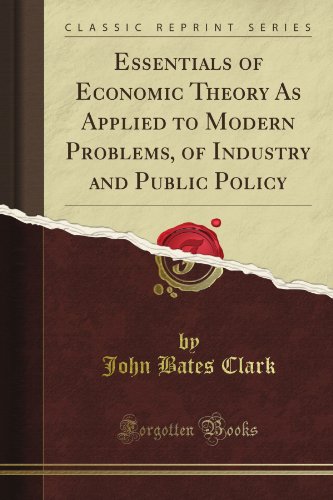Background
John Bates Clark was born on January 26, 1847 in Providence, Rhode Island, United States.



( This work has been selected by scholars as being cultur...)
This work has been selected by scholars as being culturally important, and is part of the knowledge base of civilization as we know it. This work was reproduced from the original artifact, and remains as true to the original work as possible. Therefore, you will see the original copyright references, library stamps (as most of these works have been housed in our most important libraries around the world), and other notations in the work. This work is in the public domain in the United States of America, and possibly other nations. Within the United States, you may freely copy and distribute this work, as no entity (individual or corporate) has a copyright on the body of the work. As a reproduction of a historical artifact, this work may contain missing or blurred pages, poor pictures, errant marks, etc. Scholars believe, and we concur, that this work is important enough to be preserved, reproduced, and made generally available to the public. We appreciate your support of the preservation process, and thank you for being an important part of keeping this knowledge alive and relevant.
http://www.amazon.com/gp/product/1363569376/?tag=2022091-20

(In a work on theD istribution of Wealth which was pubU sh...)
In a work on theD istribution of Wealth which was pubU shed in 1899, I expressed an intention of offering later to my readers a volume onE conomic Dynamics, or The Laws of Industrial Progress. Though eight years have since passed, that purpose is still unexecuted, and it has become apparent that any adequate treatment of Economic Dynamics will require more than one volume of the size of the present one. In the meanwhile it is possible to offer a brief and provisional statement of the more general laws of progress. Industrial society is going through an evolution which is transforming its structure and all its activities. Four general changes are going on within the producing organization, and the resultant of them, under favorable conditions, should be an enrichment in which all classes would share. Population is increasing, capital is accumulating, technical methods are improving, and the organization of productive establishments is perfecting itself; while over against these changes in industry is an evolution in the wants of the individual consumer, whom industry has to serve. The nature, the causes, and the effects of these changes are among the subjects treated in this volume. The Political Economy of the century following the publication of theW ealth of Nations dealt more with static problems than with dynamic ones. (Typographical errors above are due to OCR software and don't occur in the book.) About the Publisher Forgotten Books is a publisher of historical writings, such as: Philosophy, Classics, Science, Religion, History, Folklore and Mythology. Forgotten Books' Classic Reprint Series utilizes the latest technology to regenerate facsimiles of historically important writings. Careful attention has been made to accurately preserve the original format of each page whilst digitally enhancing the aged text.
http://www.amazon.com/gp/product/B008HABLS0/?tag=2022091-20

( This work has been selected by scholars as being cultur...)
This work has been selected by scholars as being culturally important, and is part of the knowledge base of civilization as we know it. This work was reproduced from the original artifact, and remains as true to the original work as possible. Therefore, you will see the original copyright references, library stamps (as most of these works have been housed in our most important libraries around the world), and other notations in the work. This work is in the public domain in the United States of America, and possibly other nations. Within the United States, you may freely copy and distribute this work, as no entity (individual or corporate) has a copyright on the body of the work. As a reproduction of a historical artifact, this work may contain missing or blurred pages, poor pictures, errant marks, etc. Scholars believe, and we concur, that this work is important enough to be preserved, reproduced, and made generally available to the public. We appreciate your support of the preservation process, and thank you for being an important part of keeping this knowledge alive and relevant.
http://www.amazon.com/gp/product/1373465344/?tag=2022091-20
John Bates Clark was born on January 26, 1847 in Providence, Rhode Island, United States.
In 1872, after an absence due to his father's illness and death, Clark graduated from Amherst College. Abandoning earlier plans to enter divinity school, he turned to economics. From 1872 to 1875 he studied at the University of Heidelberg under Karl Knies, leader of the German historical school, and at the University of Zurich.
On his return Clark participated actively in the creation of a "new" economics, becoming the third president of the young reformers' American Economic Association. He was professor of history and political economy at Carleton College until 1882. He then taught at Smith College, Amherst, and Johns Hopkins University. From 1895 until his retirement as professor emeritus in 1923, Clark was part of the influential faculty of political science at Columbia University, where he edited the Political Science Quarterly (1895 - 1911).
After 1911 he devoted himself to pacifist causes and served as the first director of the Carnegie Endowment for International Peace. Near the turn of the century, rapid industrial development and serious discontent, especially with the anomalous distribution of wealth, prompted Clark to examine problems of production and distribution. The indisputable influence which he exercised upon at least a generation of economists lay more in his development of analytical tools than in the conclusions he drew from them. Through his marginal utility principle, developed independently of Léon Walras, Carl Menger, and W. S. Jevons, Clark became the leading theorist of a marginal productivity theory of distribution which idealized the relationship between income and an individual's contribution to goods or services.
Clark's first important work, The Philosophy of Wealth (1885), attacking the hedonistic and atomistic assumptions of classical economics, attempted to tie economics to social ethics. Clark's major contribution, The Distribution of Wealth (1899), discarded his early reformist tendencies to present a deductive system of economic harmony based upon the competition of rational, self-interested men inevitably progressing.
Dynamic laws, to be discovered by future generations using refined empirical techniques, were formulated tentatively by Clark in the last chapters of Distribution and in his later Essentials of Economic Theory (1907) on the basis of static economics and an optimistic justification of the status quo.
Clark's other important works included The Modern Distributive Process (with Franklin H. Giddings, 1888); The Control of Trusts (1901); The Problem of Monopoly (1904), influential in the antitrust legislation of 1914; Social Justice without Socialism (1914); and A Tender of Peace.
He was the first economic theorist from the United States to achieve an international reputation. He formulated an original version of marginal utility theory and was an opponent to the Institutionalist school of economics. His most famous works - The Philosophy of Wealth (1886), Capital and Its Earnings (1888), The Distribution of Wealth (1899). Most of time in his career he was an emeritus professor at Columbia University.
(In a work on theD istribution of Wealth which was pubU sh...)
( This work has been selected by scholars as being cultur...)
( This work has been selected by scholars as being cultur...)
(The Distribution of Wealth A Theory of Wages Interest and...)
Until 1886 Clark was a Christian socialist.
Clark began by assuming that society was a biological organism subject to collective moral judgment. Then he divided economics into "static" and "dynamic" analysis, a distinction which continues to characterize American economics. Clark's own analysis was a static description of economic laws in an unchanging society where perfect competition led to economic equilibrium. Static phenomena were not analytical abstractions but real economic forces isolated from dynamic laws of social change so that the mechanics of distribution were revealed.
To Clark, population growth, improvement in tastes, capital accumulation, technological innovation, and industrial organization were dynamic, necessarily progressive forces.
Quotations: "If nothing suppresses competition, progress will continue forever".
